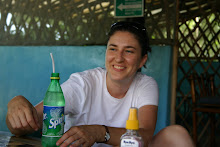I'm trying to settle into my new job and learn all the rules, both spoken and unspoken. It hasn't helped that I have been very ill and had to take days off right when I'm trying to make a good impression with this staff!
So I'm starting later with my project than the other students in my master's cohort. Some of them have already been collecting data and I'm trying to learn where to get my copies made! But I really need to focus now, sit down and make some decisions about my project. I have many ideas and probably need to narrow them down and make sure to connect them to the research literature.
One of the first types of data I want to gather is information from parents and guardians in the form of face-to-face interviews. I don't know if this is too ambitious, as I plan to make this a starting point with how I proceed with my class. Interviews are a fascinating process to me, but they take a lot of time.
What I'm really struggling with is talking with parents about poverty. I'm concerned about building trust with this new community while talking about a topic that has a possible social stigma attached with it. Will they see me as a condescending outsider? Will some parents want to prove how they are not poor? Maybe I shouldn't talk about poverty directly. Maybe instead I should ask about their goals and concerns for their kids. Is that avoiding the issue or giving a basis for my understanding of the community?
Sunday, September 28, 2008
Sunday, September 21, 2008
From Graffiti to Farmlands
 For years my morning drive used to be a 5 - 7 minute trip through city streets to go work at a poor inner-city school in one of the largest school districts in California. We dealt with frequent graffiti tagging, homelessness, and once with a gang-related shooting death. These are issues that urban schools face and I never expected nor wished to work anywhere else.
For years my morning drive used to be a 5 - 7 minute trip through city streets to go work at a poor inner-city school in one of the largest school districts in California. We dealt with frequent graffiti tagging, homelessness, and once with a gang-related shooting death. These are issues that urban schools face and I never expected nor wished to work anywhere else.Now my drive to work is a 20 - 30 minute commute through the country. The pace is slower at my new rural school and teachers and children do not seem to be wound so tight.
I want to study poverty and I am sure my new Title I school will provide ample opportunities to deal with the issue with my students. At the same time, I marvel at what I see in my new classroom. For the first time, I have students with braces and no students with silver teeth. For the first time, a girl wore a cheer leading outfit to school and no one is wearing the same t-shirt day after day.
Maybe since this district has only two elementary schools I am seeing children from different social classes represented in my classroom. There must be more economic diversity here than I have experienced before.
I thought I knew what poverty looked like, but maybe I just knew what city poverty looked like. I am having to change my perceptions. I thought moving from one Title I school to another would seem the same, but I find myself dealing with culture shock. Students out here are quieter. Adults are more calm. I hear no yelling!!
Poverty out in the country might have different issues than those found in the city. It's going to be my job to figure out what the pressing issues are here and figure out a way to address them with my new class.
Thursday, September 11, 2008
Change is in the air...
I am elementary school teacher who just changed school districts four weeks into the school year. Change is good. I am looking forward to working at my new campus and conducting research in order to finish my master's degree. I want to explore the issue of poverty with my new third grade students and their families in a way that challenges the common assumptions about people who live below the poverty line.
It will also be interesting for me to experience the differences and similarities of working in a small rural district after spending nine years in a large urban one. Both places experience high rates of poverty and I can't wait to get going and start learning alongside my students!
It will also be interesting for me to experience the differences and similarities of working in a small rural district after spending nine years in a large urban one. Both places experience high rates of poverty and I can't wait to get going and start learning alongside my students!
Subscribe to:
Comments (Atom)

